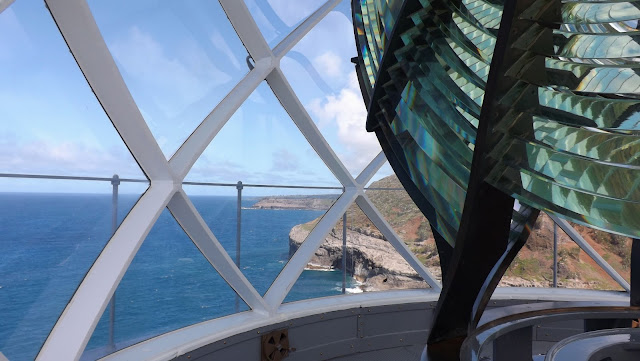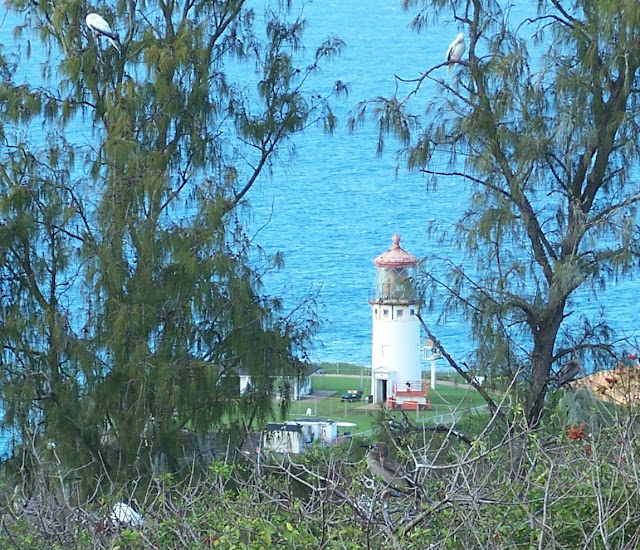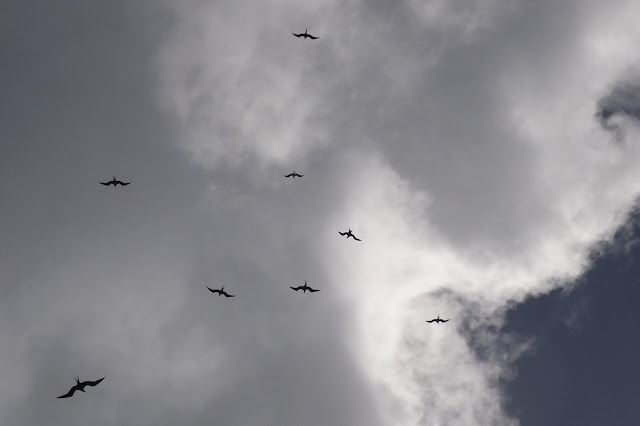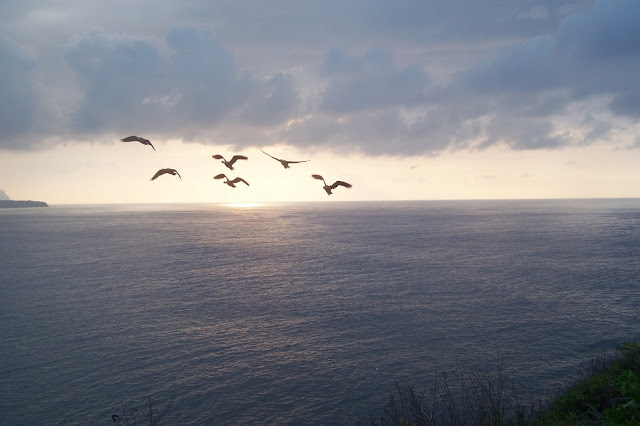Lighthouse
Centennial Restoration
It
has been 100 years since the lighthouse opened May of 1913. Planning on the centennial celebration
started about ten years ago when the fundraising began for restoring crucial
parts of the decaying building. Private
citizens donated about one third of the final costs and the balance was shared
by various government agencies at every level.
The building was closed down and alternately fenced off, boarded up, bagged, hidden, and
unavailable for two years much to the dismay of lighthouse tourists. With technological advancements including GPS,
lighthouses are obsolete in function. There is a small solar powered beacon
situated next to the classic structure as a courtesy to local fishermen since 1976. But as a romantic historical site, the restoration was
deemed valuable.
Of
course, Kilauea Point became a National Wildlife Refuge in 1985, and management
was transferred to them from the Coastguard. The Point has one of the best scenic views
up and down the coast besides being breeding grounds to many of Hawaii
But
back to the lighthouse which is quite symbiotic with the refuge, it was time
for it to shine on the first Saturday of May.
Nearly ready
The old paint was removed down to raw cement and bare metal,
the new paint should withstand the harsh salt, sun, wind, and rain of The Point
The lens was not restored but preserved, last minute care up in the lantern room
All the corbels have been replaced. The old metal ones were about shot. They are non-supportive of the catwalk, just decorative. The vents were restored and there is airflow again when in the watch room.
How bad was it?
The old vent ball from the very top
The new one in place along with the new cap ready for another 100 years
Interesting when the restoration discussions started it came up that originally the cap had been black. Most of us weren't aware of that as the pictures had been black & white and red would have looked black anyway. Should it be restored to original? That just was not going to fly as all of the logo materials, paintings and color photos of it over the years showed it the classic red & white of the US Coastguard since the 1930s.
I was happy to do the training as a lighthouse guide and
for the five days of celebration, I conducted several tours as did a number of
other volunteers. Here is a visual tour
from the top down.
In the lantern room, the lens just below the vented ceiling
The Fresnel clam shell lens is still stunning today,
shipped from France 100 years ago and put together in the room
The lens is immobile now but used to rotate in a vat of mercury and compressed air,
blinking twice every 10 seconds
View from the top with Crater Hill and Mokolea Point beyond all part of the refuge now
The curved glass panes of the lantern were not replaced but recaulked
The curved glass panes of the lantern were not replaced but recaulked
This is a picture I took of the floor prior to restoration
No one is allowed to walk on the top floor of the lantern room now
The 266 glass tiles were replaced, each handmade by a glass artist on the mainland. The tiles let light down into the Watch room directly below for the keepers who worked at night.
It must have been like a strobe in there!
It is quite beautiful
Looking up inside the lens, the horizontal brass wheels
aided the rotation of the light mechanism
The watch room is where most of the light keepers work was done. Keep in mind when the structure was designed and built, there was no electricity. The light rotated by a weight and pulley system the light keepers winched up every 3.5 hours. The light itself was an oil vapor lamp with a fabric mantel - like a combination kerosene lamp & Coleman lantern.
For those of us who saw the condition it was in before,
we are impressed by the new paint alone
Even more impressive is that these windows were made to the original specs, framed in teak
They had been cemented in at some point due to maintenance issues
Between the service room and the watch room there was an airlock door (like a submarine)
Keeping at least one door shut at all times prevented a huge gust of wind from running up the building and putting out the flame. These new doors are stainless steel made to look like the original painted cast iron
First floor
The vapor lamp was replaced with electric and the winch system replaced with a motor in 1930. The dippled paint shown above was intentional to make it feel historic, also true for the vintage light. The jacket belonged to a former light keeper, employee of the US Coastguard.
Let the tours begin!
People had a choice of paper booties over their shoes or barefoot
Assistants were vigilant to catch shoes that tried to blow away
Note solar powered beacon at right that still blips light at night
Note solar powered beacon at right that still blips light at night
The Nene love the new sod
A 20 foot perimeter was dug 12" deep and the soil removed in case it had lead paint from the removal; not likely since there was a canvas bag the full height of the building and a vacuum continuously picking up particulate. However, there is something about the new sod these guys really like - they are inside that 20 foot radius. The green line on the side is copper grounding. The original building had guy wires that probably weren't very bird friendly.
WILDLIFE
REFUGE
Since
living on Kauai I have come to appreciate
seasons based on the critters and water conditions. Winter is albatross season, whale season, and
surf season. Summer is north shore snorkeling
season. Fall is shearwater fallout
season. Spring is when the albatross chicks get big and golden plovers put
on their mating suit or tuxedo and head for the arctic to breed.
While
many of us refer to Kilauea Point as the Lighthouse,
it is confusing if we mean the refuge.
The historic structure is certainly a charming landmark and draws
tourists. However, the real beauty of
Kilauea Point is the whole 170 acres that make up the wildlife
refuge. A good deal of the wildlife on Kauai happens to be birds and the rugged coastline is
home to seabirds.
Moku 'ae 'ae (mo-coo-eye-eye)
Islet off the point
Red tail Tropicbird
Several hover and squawk as a courting ritual
They nest on the cliffs and remote parts of the refuge
They nest on the cliffs and remote parts of the refuge
Looking East from the Point
Crater Hill and Mokolea Point beyond were added to the refuge
Red tail Tropicbird flying between the Point and Crater Hill
the white dots below are all Red-footed Boobies nesting in trees
Lighthouse from Crater Hill
Several adult boobies (white) and one juvenile at bottom center (brown)
Notice lens is boarded up,fencing and scaffolding in place during renovation
Two nene with White-tail Tropicbird soaring
Looking at the old crater from Mokolea Point - the lighthouse far right
Juvenile albatrosses courting on Albatross Hill
Wedgetail Shearwater in burrow left of sign
Wedgies nest in the sides of hills, cliffs, and along people paths
Great frigatebirds soaring on any gusty day
Nene family up behind the Visitor Center
LIGHTHOUSE
NAME CHANGE CEREMONY
Daniel K.
Inouye Kilauea Point Lighthouse
Saturday
May 4th was the long awaited day when the newly renovated lighthouse
would get a new name. Senator Inouye was
instrumental in many decisions benefiting his state and he jumped on the
bandwagon for the renovation securing $1 million toward it.
Mayday
or the first Saturday of May each year has been when the Point traditionally stays open till 7pm and the light (bulb) is lit at 6:15.
May Day lighting of the Lighthouse just before renovations were begun
Since discovering the tradition I try not to miss it – not just to see the light, and I love lights, but because of the magic of being up there when the birds return. The refuge really belongs to them and people are typically shooed away at 4pm. When the Shearwaters and Nene return at dusk to find human activity and chatter, they are surprised and sometimes circle just to make sure they have homed in correctly.
Nene putting on the brakes as they start to land and see
PEOPLE at sunset?
PEOPLE at sunset?
This year the celebration lasted five days, tours given Wednesday
through Sunday, but Saturday was the big day and the ceremony. Some volunteers worked every day or all
day. I was on site from 9am to 7pm. The staff provided breakfast and lunch,
snacks, water refills (for our bottles – no more handing out thousands of
plastic ones).
Pancho Graham started playing at 10 am and I got him to
announce my 10:30 tour – the tours took care of themselves after that.
Pancho - sweet slack key
The entertainment continued all day as tourists who just
happened to show up counted themselves lucky.
Tours were free but had to be signed up for an hour in advance
Tickets issued became souvenirs
Sun, light rain, or downpours,
the tents kept everyone comfortable waiting for their tour to begin
the tents kept everyone comfortable waiting for their tour to begin
There were a few tears as there was a 44" height requirement :(
We just sent the short people over to do some coloring
Marie (Americorps) always volunteers at Lighthouse events
This was the magnet coloring and tattoo station
See the Lighthouse tattoo on her nose?
Along with all the other activities, talks were given in the lower visitor center. Shannon, head of the refuge gave a talk on the restoration project, Gary Smith gave a talk on the history of Kilauea town,and Steve Soble gave a talk on the how the lighthouse worked in its glory days. And the beat went on.
The Waipa Serenaders followed Pancho
Jen Waipa in her ranger outfit is head of volunteer services
She has a beautiful voice and sings in Hawaiian, of course
Hula dancers with their uli uli feathered gourd rattles
This halau is Palaihiwa O Kaipuwai
Younger dancers wait in back to perform
The tours ended by 4pm, chairs were set up in the tent and
we were ready for the dedication.
When the pu or conch sounds it will begin
It was quite a turnout politically as County Council members, the mayor, three senators, Hawaii representatives, head of Fish and Wildlife as
well as key local people.
Chicken skin!
Gary Smith
Head of fundraising project for restoration
Speeches were short, moving and to the point. Gary Smith has been critical in both fundraising and consciousness raising regarding the refuge. As the last sugar plantation manager's son, he grew up in Kilauea and was no stranger to the point his whole life. He was instrumental in getting the additional lands set aside for refuge rather than commercial development.
A squall coming toward the festivities
Rain came and went; once the speeches were completed,
Kehau's Halau performed
Keahu chanting and pounding her double ipu drum
Kehaulani Kekua of 'Ie 'ie Foundation that promotes cultural arts
The traditional performance reminded everyone the land and sea are still very Hawaiian

The light was weak, it rained, it was fantastic.
The original light provided safety to mariners and planes. The technology of the lighthouse was replaced by other means but the point still gives light and hope as a refuge. As people finally drifted away it was time for the the birds to settle in for the night.
A shearwater returns home
Sunday May
5
Gil
volunteered to drive a cart in the parade celebrating Kilauea
town’s 150 year celebration. Na Aina Kai
Botanical Garden where he volunteers delivered three of their bright carts for
various senior citizens. Shawn Leong who
works at Na Aina Kai had restored all the carts and belongs to Kauai Classic
Cars participating in the parade. I rode
along and as a passenger I didn’t get to see all the vehicles, but the
spectators were a hoot. I did get some
shots before we started.
Gil has the yellow cart with folks from Kilauea Senior Center
Their purple shirts are from Kauai Police Dept.
Their purple shirts are from Kauai Police Dept.
Note the gal behind the cart on a recumbent trike tricked out with purple streamers
Robert is driving the purple cart with people who had once worked the plantation
Jack got the red cart with Kimura Ohana on board
This classic Mustang was a wet ride for former lighthouse keeper Don Garnett
This group of firecrackers from the Senior Center walked in front of us
When the parade started about two minutes late they all explained it was on Portuguese time!
The equine club had this cute little carriage
The ukulele club practiced before we started
A sugar train sent in by Grove Farm
We have actually ridden this one in Lihue (on its tracks)
There were walkers, bikes, elderly trikes, a Harley with two cowgirls and everyone held up well, full of smiles even though it poured rain from the moment the parade got under way until it was over!
Marty Fernandez photo
I'm next to Gi in my rain coat but should have worn rain pants, too!
Marty watched with the other spectators ready to give us rides back to our cars
One of the houses we passed should have entered their car complete with the ferns
The Purple Lady of Kilauea in front of the purple house
Her little purple car isn't in the picture
There were some nice classic cars
(not sure why the SUVs parked here)
We got a lift back to our car, then took a shuttle out to
the Lighthouse so Gil could take a tour and see the renovation first-hand. He had raced the day before and just got there in time for the ceremony. We checked out the Party in the Park at Kilauea ’s ball field, visited booths, listened to one of
the bands and went home, soggy and tired.



























































nice
ReplyDelete